Who doesn’t know Pepsi? The well-known beverage giant. PepsiCo is a multinational food and beverage company. It has a vast portfolio of iconic brands like Pepsi, Lay's, and Quaker Oats. It is headquartered in Purchase, New York, and continues operating as a top brand.
PepsiCo ranked 33rd on the Interbrand list in 2024. Its well-structured organizational division is the reason for Pepsi’s consistent success.
Understanding this structure offers valuable insights for businesses aiming to optimize their workflows. Let's explore the organizational chart of PepsiCo and its strategies to increase business awareness.
In this article
Organizational Structure of PepsiCo
Organizational structure is the chart that helps break down the roles and responsibilities. It helps understand who reports to whom and the firm’s information flow.
PepsiCo has a team of over 300,000 people working in more than 200 countries. Managing such a large number of people is no easy feat, but PepsiCo controls that well because of its well-organized division.
Leadership Structure
PepsiCo has a top-down leadership approach. The company is led by the CEO, who also acts as the Chairman of the Board of Directors.
Company stockholders carefully select board members based on their experience and industry connections. This meticulous process ensures that every company member is worthy of his position.
Its organizational leadership allows easy decision-making. Leading to increased coordination and collaboration across the company’s global divisions.
Key Divisions
Additionally, PepsiCo has a strong geographic focus. Its operations are segmented in North America, Europe, and the Asia Pacific.
All these regions are further broken down into three primary product-based divisions: beverages, snacks, and Quaker foods. These segmented divisions enable PepsiCo to cater to varying consumer preferences. All while driving regional growth.
Analysis of the PepsiCo Organizational Chart
Pepsico employs a hybrid organizational structure. This style combines divisional and functional models to address diverse global operational needs. Let us look at Pepsico’s divisions further.
Its organizational structure is divided into 2 categories, as shown in the chart below.
- Market-based divisions
- Function-based group
Market-Based Division
Starting with the market-based division. This category includes CEOs of all the regions where PepsiCo operates. Some of the most essential personnel include:
| Geographical Locations | Region CEO |
| North America | Steven Williams |
| Europe, Middle East, Africa (EMEA) | Silviu Popovici |
| Latin America | Paula Santilli |
| Asia Pacific, Australia/New Zealand, Greater China (APAC) | Anne Tse |
| Middle East | Ahmer El Sheikh |
| International Franchise Beverages | Eugene Willemson |
| U.S Beverages | Ram Krishnan |
Function Based Group
In a function-based group, each member is focused on a specific department of PepsiCo. These departments range over many operations. Some major departments of PepsiCo that are crucial globally are:
- Finance
- Operations
- Science and Research
- Marketing and Growth
- Sustainability
- Diversity, Equity, and Inclusion
- Legal and Corporate Affairs
- Human Resources
- eCommerce
- Foodservice
- Transformation
How to Create an Organizational Chart
Impressed by how easily all that information was compiled into the org chart? Why not make your own? EdrawMind is just the right tool for that. It is beginner-friendly software filled with intuitive features. Its pre-made templates are a lifesaver. They cut out hours of extensive labor.
Let us show you how to make your Organizational Chart using EdrawMind’s template.
Before you begin, access EdrawMind online or its desktop version. Then, log into your Wondershare account.
Step 1
Go to the Gallery section in the dashboard’s left-hand panel. Use the search bar to look up Org Chart, and select a template that suits your project’s needs. Click Duplicate to start creating.

Step 2
You'll be redirected to a blank canvas where you can start customizing. Simply double-click on the relevant fields. A floating panel will appear where you can adjust the font style, colour, and size. Do the same when adding the names and other information.
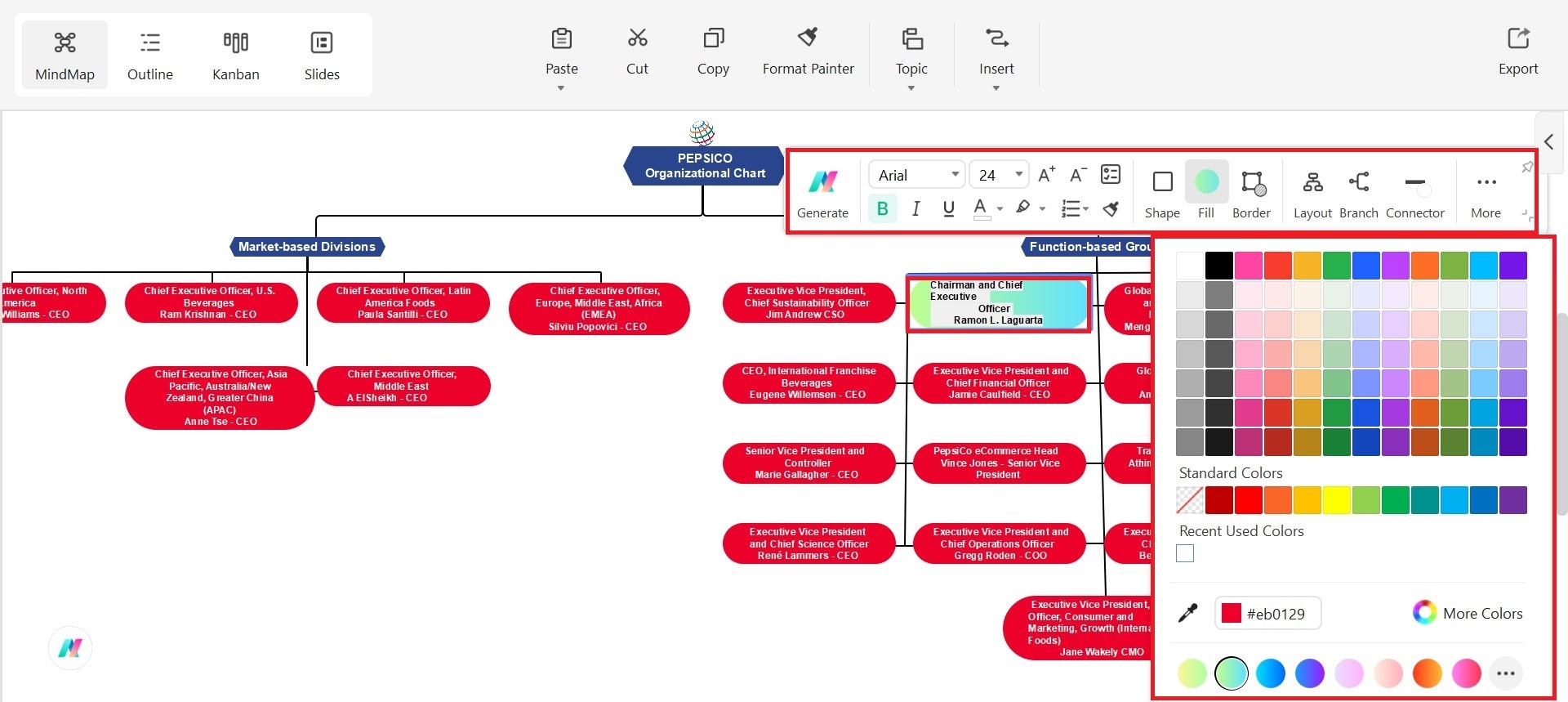
Step 3
Time to design your chart! Navigate to the right-side customization panel. Refine colors and layouts to your taste. Make your chart engaging with org-chart-specific clipart and symbols. All are available in the Clipart section in the top-right corner.
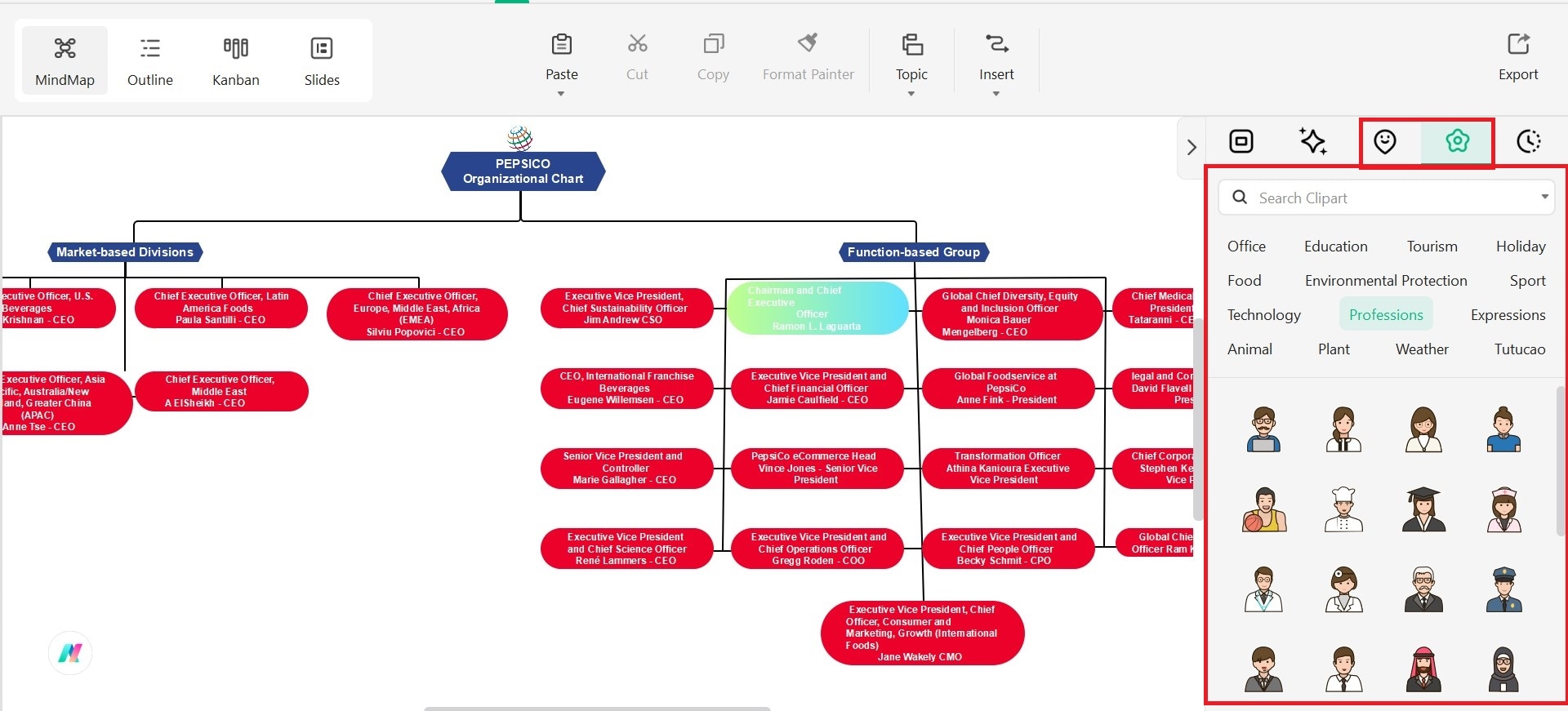
Step 4
Highlight key team members by incorporating their photos from the Insert tab. This step is up to you and worth it for an interactive look.
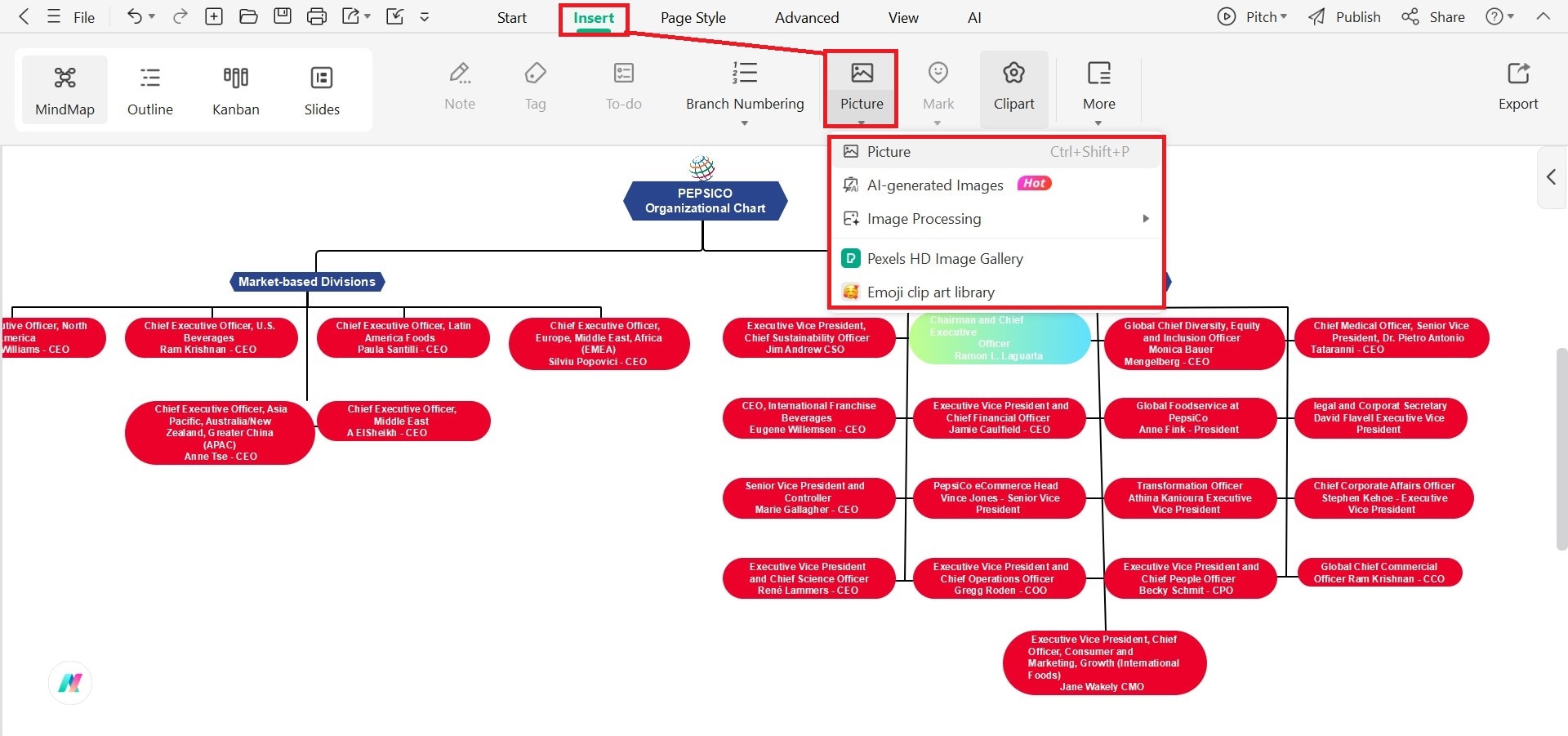
Step 5
Voila! Your chart is ready. Download it in the format of your choice from Export at the toolbar. EdrawMind provides various options like Excel, PDF, JPG, PNG, and more.
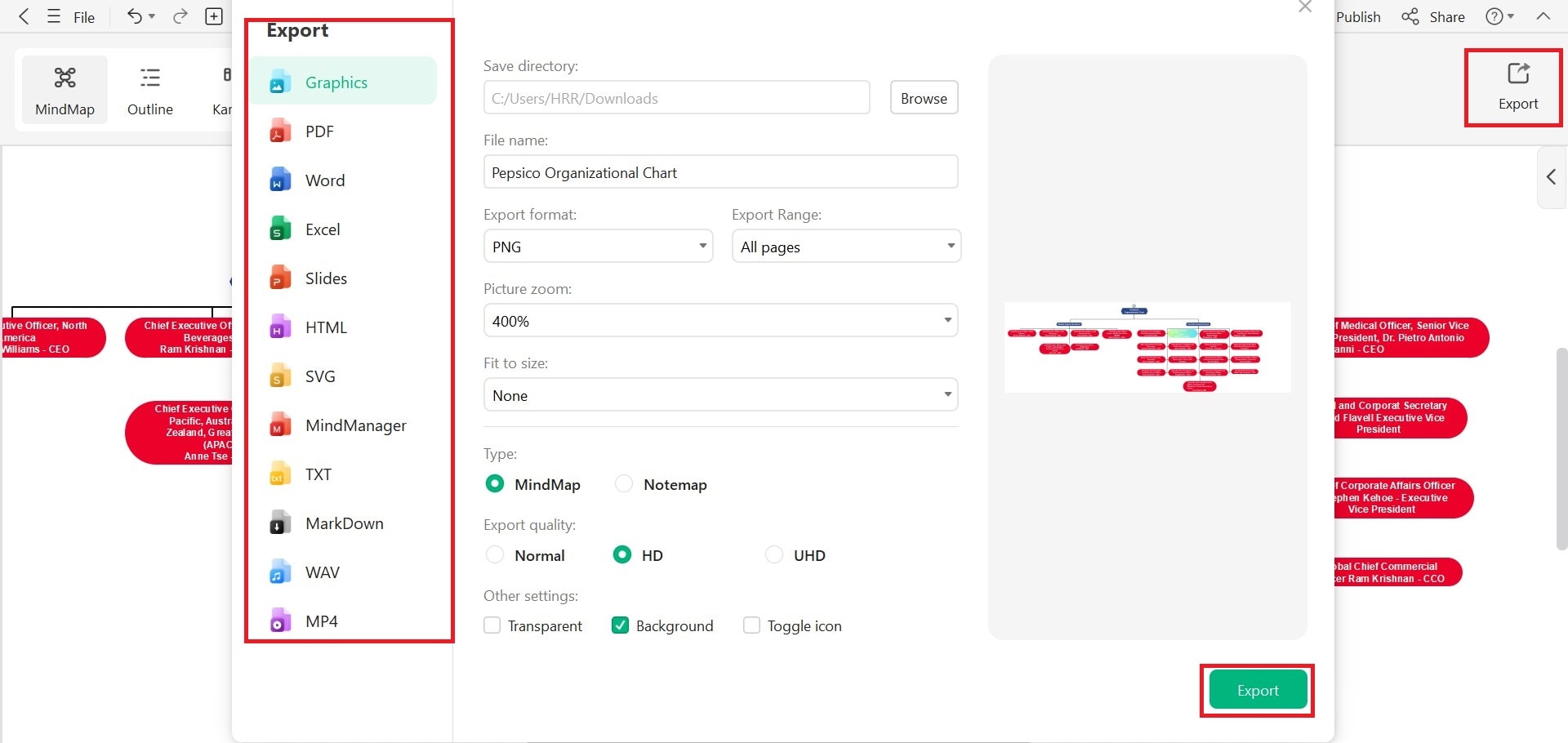
How to Choose the Right Organizational Structure For Your Business
Choosing the right organizational structure is crucial for achieving business goals. It sets up a clear path and optimizes understanding of the corporation. But how do you decide which structure fits your organization best? What factors should you consider?
Here's what you need to know to answer all those questions: There are three main types of organizational structures.
- Functional structure: The most common type of business structure. Divides a company into departments based on areas of expertise and skills.
- Divisional structure: Organizes the company into semi-independent units as Divisions. These divisions operate as a company within their company.
- Hybrid structures: Also called Matrix structures. Employees report to multiple managers/leaders to foster open communication channels.
Let's see how these three organizational structures work with different company sizes.
- Startups and small businesses: A functional structure is often best for smaller companies. This type of structure helps focus on specialization. It is cost-efficient, requires lower training costs, and optimizes resources. Under this structure, employees can concentrate on core responsibilities. This allows quick decisions and streamlined operations.
- Medium-sized enterprises (SMEs): A divisional structure is best for growing companies. It allows the business to expand its product lines and geographical locations. All while maintaining focus on each division's unique goals.
- Large corporations: Hybrid or matrix structures are ideal for complex organizations like PepsiCo. This model combines the strengths of functional and divisional approaches to get the best of both worlds.
Summing Up
There you have it! A deep dive into the infamous organizational structure of PepsiCo. PepsiCo’s visual representation highlights the sheer importance of clear hierarchies. These organizational structures optimize frameworks and help recognize bottlenecks.
Tools like EdrawMind can help businesses visualize and experiment with different organizational structures. Whether you're a startup or a multinational corporation owner, leveraging such tools simplifies operations and aligns goals. EdrawMind template gallery will help you find the best fit for your organization and transform your business.



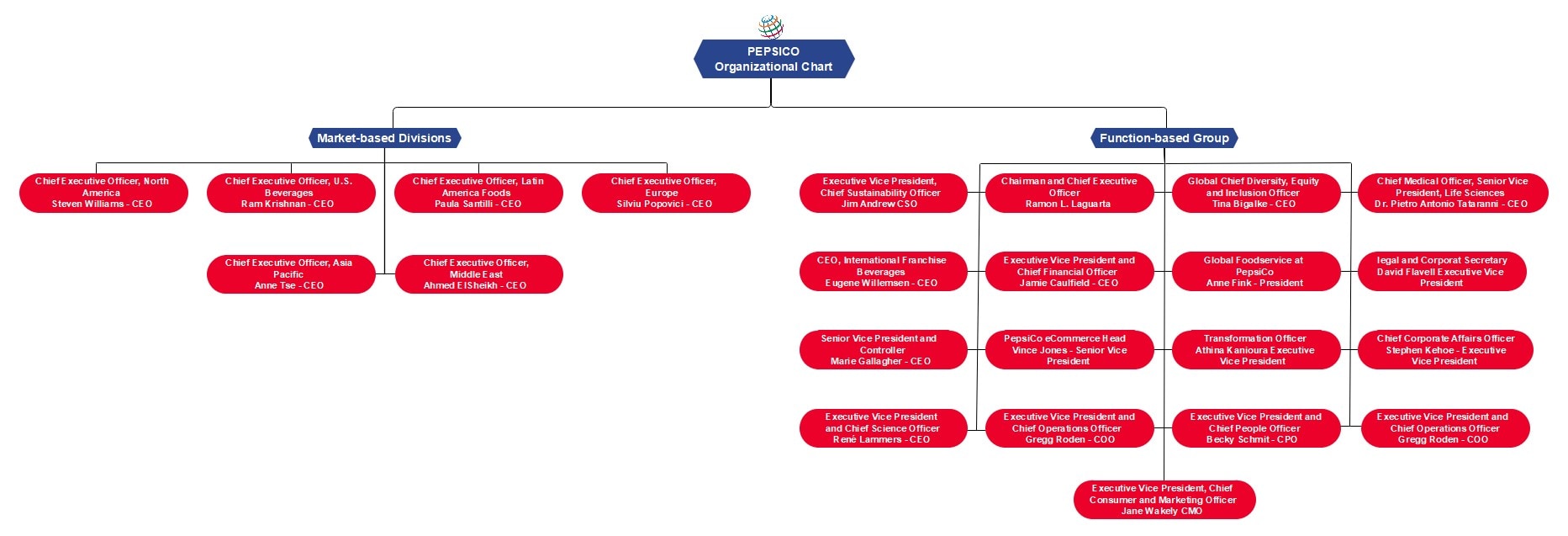
 below.
below.  below.
below. 

